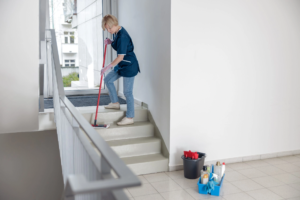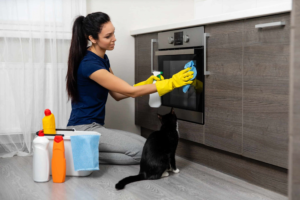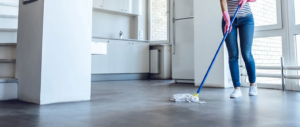[fsn_row][fsn_column width=”12″][fsn_text]
When’s the Best Time to Pressure Wash Your House? Here’s What the Pros Recommend
Maintaining your home’s exterior isn’t just about looking good—it’s about preserving the value and integrity of your investment. Over time, your siding, walkways, driveway, and patio can accumulate dirt, mold, algae, and other grime that not only looks unsightly but can also cause long-term damage if ignored. One of the most efficient ways to restore your home’s appearance and prevent surface deterioration is pressure washing.
But timing matters. When is the best time to pressure wash a house? The answer depends on your local climate, seasonal conditions, and even the type of dirt or buildup you’re dealing with. To help you decide, the experts at ProClean have broken down the pros and cons of pressure washing during each season and provided additional tips to get the best results.
Best Time of Year to Pressure Wash
Spring: The Optimal Season
Spring is widely regarded as the best time to pressure wash your home. After a long winter, your home’s exterior is often left with dirt, salt, mildew, and other residues that can cause staining or deterioration. The mild temperatures, lower humidity, and increasing daylight in spring make it ideal for pressure washing.
Additionally, spring cleaning isn’t just for the indoors. A thorough power wash can prepare your home for outdoor entertaining by creating a fresh, welcoming appearance. Since spring typically offers moderate weather, you’ll avoid the extremes of summer heat or winter chill, ensuring a safe and efficient clean.
Summer: A Convenient Alternative
If spring slipped by or your schedule didn’t allow for an earlier clean, summer is still a great option for pressure washing—especially if you’re preparing for backyard events or just want a clean home during peak outdoor season.
Pros include:
- Fast drying due to higher temperatures and sunshine
- Longer days, giving you more time to complete projects
- Ideal before pool parties, barbecues, or home showings
Potential drawbacks:
- Midday heat can make outdoor work uncomfortable or even unsafe
- Some areas enforce water usage restrictions during droughts
- High demand for professional services may result in longer wait times
If you’re planning to power wash in summer, aim for early morning or late afternoon when it’s cooler and surfaces aren’t scorching hot.
Fall: A Good Time to Prep for Winter
Fall can be a very effective time to pressure wash, particularly if you’re preparing your home for cold and wet weather. Removing dirt, leaves, and mold in the fall ensures these materials don’t freeze or decay on your home during winter, which can lead to permanent staining or damage.
Why fall works:
- Cooler weather is easier to work in than summer heat
- Professional services may have more availability
- A good time to clear gutters, siding, and patios before leaf buildup worsens
However, weather conditions in fall can be unpredictable. Wind and rain can interfere with washing or prolong drying times. Additionally, falling leaves can quickly undo a fresh clean, so timing is crucial.
Winter: Not Recommended in Most Cases
While it is possible to pressure wash in winter under specific conditions, it is generally discouraged, especially in areas that experience freezing temperatures.
The main concerns include:
- Water can freeze on surfaces, creating slippery hazards
- Lower sun exposure leads to slower drying, increasing mildew risk
- Cold weather can impair the functionality of pressure washing equipment
- Ice buildup can lead to safety issues or damage to walkways and steps
If pressure washing is necessary in winter, wait for a mild, sunny day and take extreme care to avoid slips and damage.
How Often Should You Pressure Wash?
The frequency of pressure washing depends on your environment and the condition of your home’s exterior. As a general rule, most homes benefit from a professional cleaning once per year. However, if your property is exposed to excessive dirt, moisture, or tree debris, you may need more frequent cleanings.
You should consider pressure washing:
- Twice a year in colder regions (spring and fall)
- After major storms that leave dirt, leaves, or debris
- If mold, mildew, or algae are visible
- If your home is near a dirt road, construction site, or dense trees
A simple test: run your finger along your siding. If you pick up dirt or see streaks, it’s time to schedule a cleaning.
Environmental and Location-Based Considerations
Where you live plays a huge role in determining when and how often to pressure wash. Here’s how to plan based on your location:
- Cold climates: Wash in spring to remove salt and winter grime, and again in fall to prep for snow.
- Humid areas: Mold and mildew thrive in moisture-rich environments, so annual or biannual washing is essential.
- Rainy, stormy regions: Wind-driven debris and water-stained surfaces can require more frequent care.
- Homes near vegetation or dirt roads: Expect more dust, sap, pollen, and organic buildup.
What Is the Best Weather for Power Washing?
For the best results, choose a sunny, dry day with mild temperatures—ideally between 50°F and 80°F. This type of weather helps the water dry quickly, reducing the risk of mildew. Avoid days that are:
- Extremely hot (can cause fast-drying streaks)
- Overcast or foggy (poor visibility and slow drying)
- Rainy or overly humid
Stick to early morning or late afternoon hours when the sun is not at its peak and surfaces are cooler.
Is It Better to Pressure Wash After Rain?
Generally, no. While it may seem like a good way to rinse surfaces, washing right after rain isn’t ideal. Wet conditions prevent effective dirt removal, can spread mildew spores, and make it harder for surfaces to dry thoroughly. Always wait at least 24 hours after rainfall, and ensure surfaces are dry before pressure washing. This will maximize the effectiveness and safety of your cleaning project.
Benefits of Hiring Professionals
While DIY pressure washing may save a few bucks up front, the long-term benefits of hiring experts like ProClean make the investment worthwhile. Professional technicians use:
- High-grade equipment for deeper, faster cleaning
- Eco-friendly solutions tailored to your home’s materials
- Season-specific methods to optimize results
- Techniques that minimize the risk of siding or surface damage
- Trained eyes to spot potential mold or moisture issues early
Hiring a pro saves time, reduces risk, and delivers results that last longer.
Protect Your Home with ProClean Now
Looking to restore your home’s shine and protect its value? ProClean is here to help. Our team of experienced maid services Abbotsford professionals understands the unique seasonal and climate needs of your home. Whether you’re prepping for summer barbecues or washing away winter’s grime, we’ll deliver superior results safely and efficiently. Don’t settle for surface-level cleaning—invest in a deep, lasting clean that enhances your home’s beauty and longevity. Call ProClean today to schedule your pressure washing appointment and get your home looking its absolute best.
Follow us on our socials here
Find out more articles that can help you below:
Can Electric Pressure Washer Clean Concrete
How to Clean Outside of House Without a Pressure Washer
How to Clean a Wood Fence Without Pressure Washing
[/fsn_text][/fsn_column][/fsn_row]





